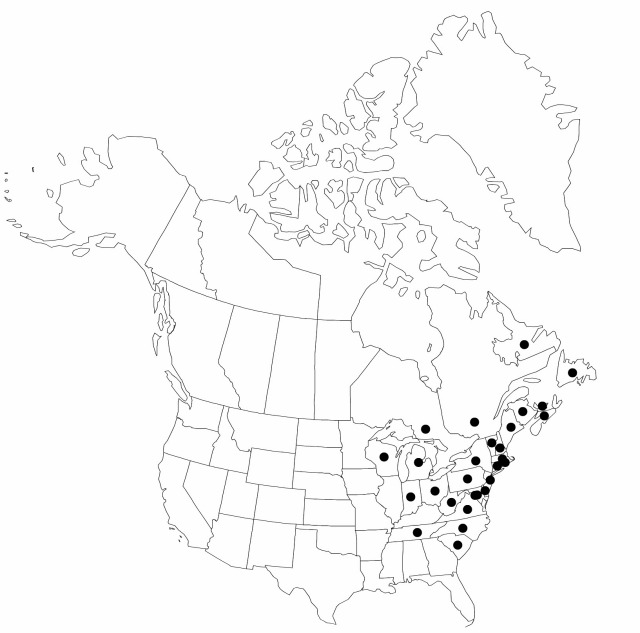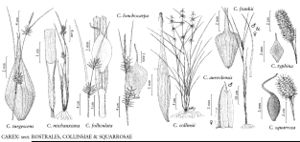Difference between revisions of "Carex folliculata"
Sp. Pl. 2: 978. 1753.
FNA>Volume Importer |
FNA>Volume Importer |
Revision as of 21:12, 16 December 2019
Culms obtusely trigonous in cross section, (25–)40–175 cm, smooth. Leaves: ligules 2.5–10 mm, as wide as long to wider than long; blades yellowish green to light green, M-shaped to flat, 6–18(–21) mm wide, smooth or sometimes finely papillose and scabrous adaxially, especially distally; widest leaves of vegetative shoots 8–18(–21) mm wide. Inflorescences 15–85 cm; bract sheaths prolonged, apex truncate to convex; proximal 3–5 spikes pistillate (occasionally a few empty scales at apex), erect or the proximal nodding, ovoid to short cylindric. Pistillate scales lanceolate to narrowly ovate, mostly 2/3 as long as to exceeding perigynia, apex acuminate-awned. Anthers 3–5 mm. Perigynia ascending to spreading, yellowish green, 18–26-veined, slightly inflated, lanceolate, 10.3–15.6 × 1.8–3.3 mm, 4–7 times as long as wide, apex gradually tapered, bidentulate; beak absent. Achenes (3.2–)3.4–4(–4.5) × 1.5–2.3 mm, (1.7–)1.8–2.4 times as long as wide. 2n = 56.
Phenology: Fruiting late spring–summer.
Habitat: Wet forests, bogs, seeps, wet meadows, marsh edges, stream banks, lakeshores, in acidic, sandy, or peaty soils
Elevation: 0–1800 m
Distribution

St. Pierre and Miquelon, N.B., Nfld. and Labr., N.S., Ont., P.E.I., Que., Conn., Del., D.C., Ga., Ind., Maine, Md., Mass., Mich., N.H., N.J., N.Y., N.C., Ohio, Pa., R.I., S.C., Tenn., Vt., Va., W.Va., Wis.
Discussion
South of central Virginia, Carex folliculata occurs only in the Appalachian mountains. Clumps of C. folliculata are striking because of the very broad, yellowish green leaf blades of their vegetative shoots.
Selected References
None.
